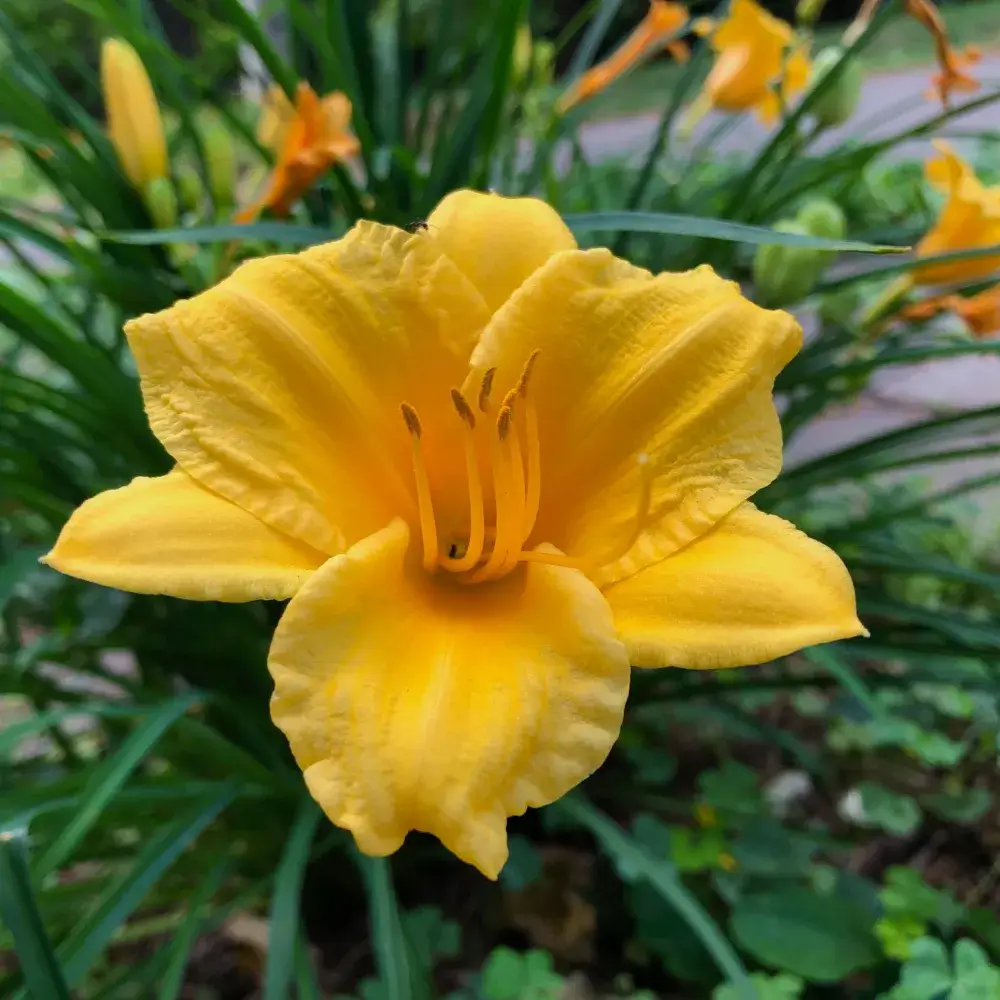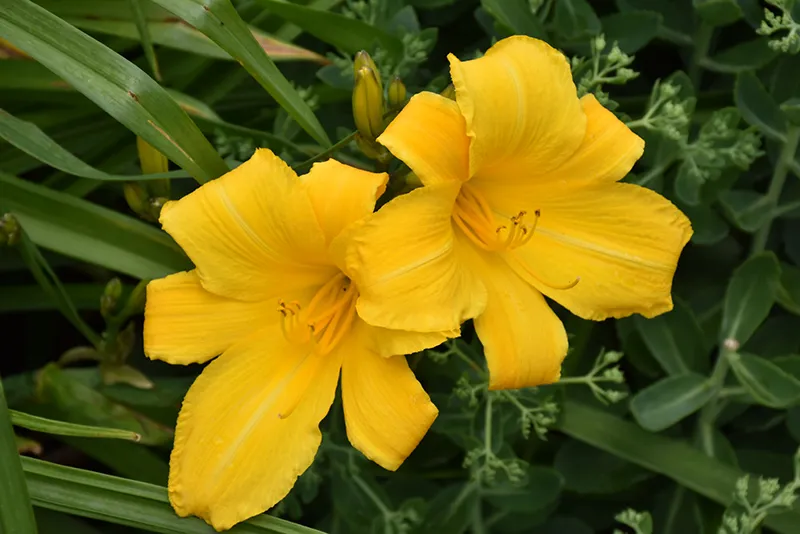Family: Daylily
Type: Perennial

Buttered Popcorn Daylily, known botanically as Hemerocallis ‘Buttered Popcorn’, is a vibrant perennial plant. It’s celebrated for its large, bright yellow blooms that resemble the color of buttered popcorn.
This daylily variety is known for its robust growth and ability to produce a profusion of flowers. It blooms from mid to late summer, providing a long-lasting display of color in the garden.
Buttered Popcorn Daylily is not only striking in appearance but also easy to grow. It thrives in a variety of conditions and is a low-maintenance choice for gardeners seeking reliable beauty.
Hardiness Zone: 2b-9a
Pet Friendly: Yes
Moisture Preference: Dry to moist
Sun Needs: Full sun to partial shade
Growth Rate: Medium
Average Height (feet): 2.5
Average Spread (feet): 2
Average Life Span (years): 10
Form: Arching
Flower Color: Yellow
Flower Shape: Trumpet
Bloom Season: From mid to late summer
Foliage Color: Green
Foliage Shape: Grassy
Incorporating Buttered Popcorn Daylily into your landscape can create a focal point of bright, sunny color. Its large, showy flowers are sure to draw attention.
Use it in borders, mixed perennial beds, or as a mass planting for a dramatic effect. The vivid yellow flowers blend well with a wide range of plant colors and types.
This daylily is also excellent for planting along walkways or in patio containers. Its cheerful blooms can brighten up any outdoor living space or garden path.

In a cottage garden, Buttered Popcorn Daylily contributes to the relaxed, charming atmosphere. Its vibrant blooms mix well with other cottage-style plants.
In modern garden settings, this daylily adds a burst of color against more structured elements. Its bold blooms can be a striking contrast in minimalist landscapes.
Buttered Popcorn Daylily is great for attracting pollinators like bees and butterflies. Planting it supports local wildlife and contributes to a vibrant, dynamic garden.
Pair with blue or purple flowers for a stunning contrast. The combination of yellow and cool tones creates a visually appealing palette.
Use as a border along fences or property lines. Its height and dense growth can provide a natural, colorful border throughout the summer.
Incorporate into a cutting garden. The blooms of Buttered Popcorn Daylily are excellent for creating cheerful, summer flower arrangements.
Select our pre-made garden layouts to create a landscape that’s uniquely yours. Simple, smart, and customizable!
In spring, the foliage of Buttered Popcorn Daylily begins to emerge. The plant starts its growth cycle, preparing for the blooming season ahead.
During summer, the daylily is in full bloom. Gardens are brightened by its large, butter-yellow flowers, making it a standout feature.
In fall, the blooms of Buttered Popcorn Daylily begin to fade. The plant starts to wind down its growth as the season transitions.
In winter, Buttered Popcorn Daylily goes dormant. The foliage may die back, but the plant will return with vigorous growth and vibrant blooms in the next growing season.
Sedum spectabile 'Autumn Joy'
Perovskia atriplicifolia 'Little Spire'
Iris versicolor 'Purple Flame'
Buttered Popcorn Daylily thrives in an area with full sun to partial shade. It’s best suited for spots that receive several hours of sunlight each day, as this promotes the most vibrant blooms.
Full sun is ideal for Buttered Popcorn Daylily, encouraging abundant flowering. It can also grow well in partial shade, where it receives some respite from the intense midday sun.
This daylily prefers well-drained soil but is adaptable to a variety of soil types. Adding organic matter to the soil can enhance growth and blooming.
Space plants about 18 to 24 inches apart. Proper spacing ensures each plant has enough room to grow and flourish, and helps prevent issues with air circulation.
The best time to plant Buttered Popcorn Daylily is in the spring or early fall. This allows the plants to establish roots before the stress of summer heat or winter cold.
Dig a hole slightly larger than the root ball. Place the daylily in the hole, backfill with soil, and water thoroughly. Adding mulch can help retain moisture and suppress weeds.
Water regularly, especially during the first growing season to establish a deep, extensive root system. Once established, daylilies are moderately drought-tolerant.
Fertilize in early spring with a balanced, slow-release fertilizer. Additional feeding can be done after the first bloom to encourage more flowers.
Deadhead spent blooms to encourage reblooming. In late fall or early spring, cut back foliage to tidy up the plant and encourage healthy new growth.
In spring, remove any dead foliage from the previous year. Apply a balanced fertilizer and water well to kickstart growth.
During summer, keep the soil consistently moist, especially during dry periods. Continue to deadhead regularly for continued blooming.
In fall, reduce watering as the plant prepares for dormancy. You can also apply a layer of mulch for winter protection.
In winter, Buttered Popcorn Daylily is dormant. It requires minimal care during this time, but ensure it's well-mulched in colder regions.
Hemerocallis 'Happy Returns'
Hemerocallis 'Stella de Oro'
Leucanthemum x superbum
Each individual flower lasts for one day, but the plant produces many blooms over a long period, typically from mid to late summer.
While no plant is completely deer-proof, daylilies are generally not a favorite for deer and can be considered moderately deer-resistant.
Yes, dividing Buttered Popcorn Daylilies every 3-5 years helps rejuvenate the plant and maintain vigorous growth. The best time to divide is in the early spring or after flowering.
Sign up below to get exclusive deals, discounts, and new plant collections—delivered straight to your inbox! Plus, stay inspired with the latest gardening tips, landscaping trends, and DIY garden ideas. Start growing with us today!
A big thank you for subscribing to the PBN Design newsletter.
We're thrilled to have you join our community. Get ready for exciting updates, insightful content, and more delivered straight to your inbox.
Stay tuned!
Go backA big thank you for subscribing to the PBN Design newsletter.
We're thrilled to have you join our community. Get ready for exciting updates, insightful content, and more delivered straight to your inbox.
Stay tuned!
Go back